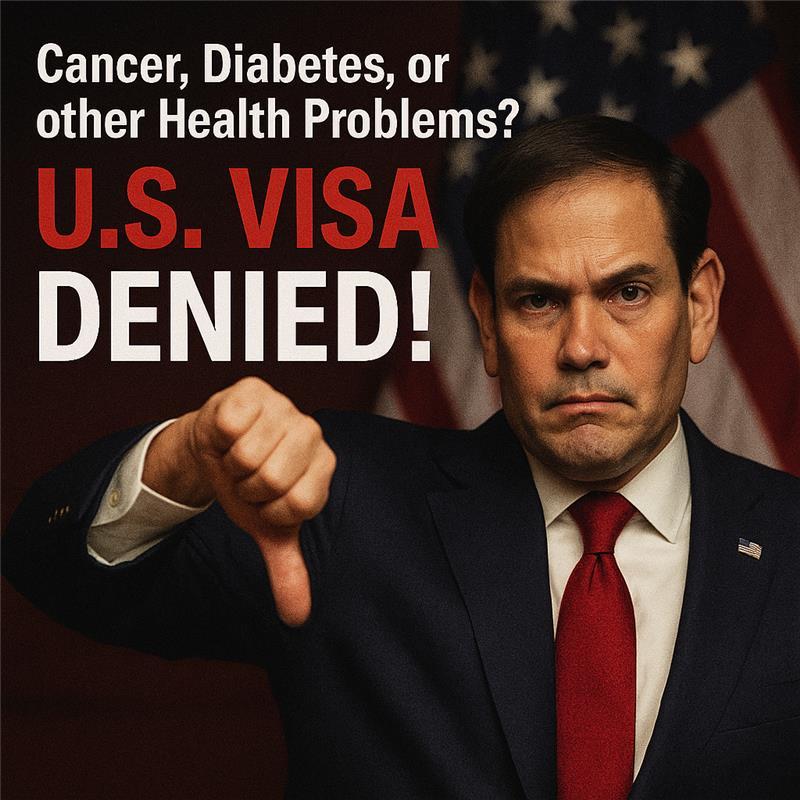- Free Consultation: (213) 251-5533 Tap Here to Call Us
When Cancer, Diabetes or Other Health Problems Trigger a Visa Denial: What You Need to Know

1. What’s happening?
Recent reporting reveals that the U.S. Department of State (DOS) issued a consular-cable instructing officers to treat certain chronic health issues — including cancer, diabetes, obesity and metabolic or neurological diseases — as factors in determining whether a visa applicant may become a “public charge.” In effect, individuals seeking U.S. immigrant visas (and potentially some nonimmigrant visas) may be denied if a consular officer determines that their health condition might lead to substantial medical costs or employment incapacity.
2. Why this matters to you
If you or a loved one are applying for an immigrant visa or adjustment of status, having a chronic health condition — or having dependents with health concerns — may now trigger enhanced scrutiny. At our firm, we advise you treat this as a serious risk factor, and plan accordingly. Because the health issue is now being weighed in the “public charge” decision-making process, you must be prepared with documentation of your condition, treatment stability, insurance/financial resources and ability to avoid reliance on U.S. public benefits.
3. Legal framework: What law supports this?
a) Public Charge Ground of Inadmissibility
Under the Immigration and Nationality Act (INA) § 212(a)(4) (codified at 8 U.S.C. § 1182(a)(4)), a visa applicant or someone seeking admission or adjustment of status is inadmissible if “in the opinion of the consular officer … the alien is likely at any time to become a public charge.” The implementing regulation, 8 C.F.R. § 212.22(b)(2)(i), states that an applicant’s health — including whether they “have been diagnosed with a medical condition that is likely to require extensive medical treatment or institutionalization” — is one of the minimum factors to consider.
b) Health-related Grounds of Inadmissibility
Additionally, INA § 212(a)(1) (8 U.S.C. § 1182(a)(1)) addresses health-related grounds (communicable diseases, lack of vaccination, physical or mental disorders associated with harmful behavior). USCIS However, chronic diseases such as obesity, cancer or diabetes are not explicitly listed there. Thus, the recent guidance appears to rely on the public-charge ground, not a new health-ineligibility ground.
c) Exemptions and Special Considerations
Certain categories (e.g., victims of crime under the U-visa regime) are exempt from the public-charge analysis. The
4. What the guidance says
According to the DOS cable as reported:
- Applicants should be assessed if they have “certain medical conditions — including, but not limited to, cardiovascular diseases, respiratory diseases, cancers, diabetes, metabolic diseases, neurological diseases, and mental health conditions — [that] can require hundreds of thousands of dollars’ worth of care.”
- It specifically mentions obesity because it “can cause asthma, sleep apnea, high blood pressure” and thus may be used as a marker of long-term health cost risk.
- Officers must ask: “Does the applicant have adequate financial resources to cover the costs of such care … without seeking public cash assistance or long-term institutionalization at government expense?”
- The health of dependents (children or elderly parents) is also a factor: whether their chronic illnesses might interfere with the applicant’s ability to work or provide for the household.
5. Practical implications
All visa applicants should be prepared to do the below:
- Disclose health conditions: If you, your dependents, or anyone in your household has a chronic disease (e.g., diabetes, heart disease, cancer, severe obesity), we need full documentation: diagnosis, treatment status, prognosis, cost of care, insurance coverage.
- Demonstrate financial self-sufficiency: Show assets, savings, employment history, health insurance, private care funding. The consular officer may require evidence you will not rely on U.S. public benefits or become institutionalised.
- Update treatment and stability records: If your health condition has stabilized, you’re on treatment, have recent doctor’s letters, you will have a stronger case.
- Anticipate scrutiny at consular interviews: Be prepared for questions about future medical cost, employment capacity, household health burdens.
- Consider visa category and exemptions: If you are applying under a category exempt from public charge (for example, a U-visa derivative), we’ll evaluate whether the new risk applies.
This policy shift represents one of the most significant expansions of health-related review in visa adjudications in years. If you or a family member are seeking a U.S. visa, green card or adjustment of status and have a chronic health condition—or a household member does—it’s essential to treat the health issue as a material risk in the admissibility analysis.
The information provided in this article and website is intended for general information purposes only and is not to be relied upon as legal advice. For a free phone consultation with Attorney Thomas Lee, please call (213) 251-5533.








